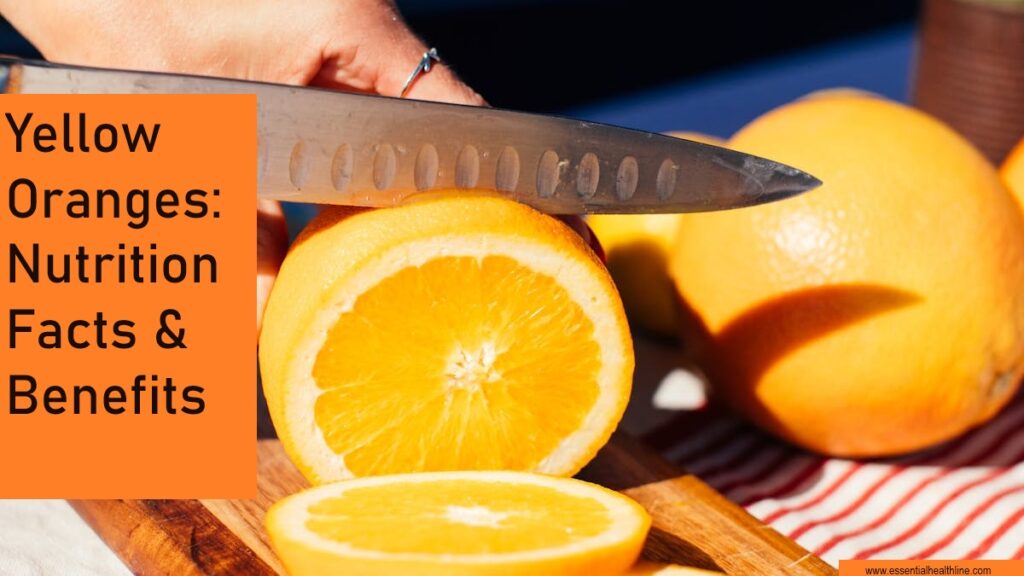Oranges are members of the citrus family, and there are various types. One of them is the yellow-orange variety, which isn’t as popular as the ones with orange peels. So, are the unripe oranges in the ripening process? Do they have similar nutritional content as those with orange and green color? And above all, are yellow oranges safe to eat?
Yellow oranges are safe to eat. The fruits’ color does not affect their edibility or nutritional value. Once the oranges mature and are fully ripe, you can enjoy them without reservations. Yellow oranges have various potential health benefits.
Read on to find out more about your safety when you consume this orange variety, its nutritional value, and how beneficial they are.
Let’s dive in.
What Are Yellow Oranges?
Yellow oranges, commonly known as Navel oranges, are a type of orange ranging from pale to bright yellow. They’re seedless, sweet, and juicy. The natural ripening process gives them a yellow color, which is influenced by the amount of sunlight and temperature.
Generally, the different types of oranges have high vitamin C content, and yellow oranges aren’t an exception. Also, being part of the broad citrus family, they have antioxidant, anti-inflammatory, and anti-cancer properties. You can slice fresh sweet oranges into salads, bake, or cook them.
Other types include:
- Mandarin oranges
- Cara Cara oranges
- Valencia oranges
- Seville oranges
- Blood oranges
- Jaffa oranges
What Is the Nutritional Value of Yellow Oranges?
As mentioned above, yellow oranges are packed with health benefits. Below is their nutritional content.
| Nutrient | Amount |
| Vitamin C | 70 milligrams (92% Daily Value) |
| Vitamin A | 14 micrograms (15% DV) |
| Potassium | 181 milligrams (5% DV) |
| Calcium | 55 milligrams (6% DV) |
| Protein | 1.3 grams (0.03%) |
| Folate | 45 micrograms (10% DV) |
| Carbohydrates | 15.4 grams (0.1% DV) |
| Fiber | 3 grams (10% DV) |
| Sugar | 12 grams (43% DV) |
| Calories | 73 Calories (0.04% DV) |
| Fat | 0.2 grams (0.003% DV) |
Are Yellow Oranges Safe to Eat?
Yes, yellow oranges are safe to eat. Despite the color difference, these citrus fruits are as edible as the orange ones. Ensure the fruit isn’t moldy or rotten; such fruits cause food poisoning.
Yellow oranges have a nutritional value similar to their counterparts, offering many health benefits.
The ‘yellow’ is the color of a fully ripe fruit of this orange variety and doesn’t influence its safety or nutritional composition. Hence, every ripe, properly handled, and stored yellow-orange is safe for consumption.
How Do I Tell if a Yellow Orange Is Safe to Eat?
A yellow orange’s appearance, feel, taste, and smell help you know if the fruit is safe to eat. A bad orange is softer, dark, and has a fermentation smell.
Also, some may be moldy and wrinkly. Such oranges are health hazardous.
When Should You Refrain from Eating Yellow Oranges?
Avoid eating yellow oranges if allergic to oranges or have medical conditions (like hyper-acidity) that discourage orange consumption. Keep off awful-smelling and tasting yellow oranges, the rotten and moldy ones.
The regular oranges are acidic and can cause stomach lining irritation if you have gastroesophageal reflux disease (GERD). Consult your doctor or nutritionist before eating. Otherwise, you may develop significant digestive issues, such as vomiting and heartburn.
Also, consult your health expert if you have high potassium levels before consuming yellow oranges. Although the nutrient quantity is mild in an orange, additional intake can cause hyperkalemia. The potentially severe health condition leads to weakness, nausea, arrhythmias, muscle fatigue, or even death.
Refrain from eating yellow oranges without your doctor’s or dietitian’s advice if you have diabetes. Oranges have a low glycemic index (low GI), triggering a slow spike in blood sugar levels.
How Many Yellow Oranges Can You Eat Without Threatening Your Health?
The oranges you can safely consume depend on your tolerance and overall health. Consume yellow oranges moderately, as overeating can cause gastrointestinal issues. 4-5 oranges daily exceed fiber DV, triggering stomach upset, nausea, diarrhea, and cramping. Also, excess vitamin C leads to vomiting, heartburn, headache, and insomnia.
Consuming large quantities of yellow oranges for an extended duration can result in skin yellowing due to beta-carotene accumulation. However, no health condition is linked to this.
What Are the Health Benefits of Yellow Oranges?
Below are the beneficial effects of yellow oranges:
- Boosting immunity
- Promoting heart health
- Preventing chronic diseases and anemia
- Supporting eye health
- Healthy fetus development
- Maintaining skin health
- Building strong bones
- Regulating blood pressure
Boosting Immunity
Yellow oranges contain minerals, vitamins, and compounds that support a healthy immune response. The immune system is your body’s defense against pathogens (disease-causing microorganisms).
Vitamin C is essential in the functioning of the Natural Killer (NK) cells. Also, it’s critical for the apoptosis process, which involves the killing, clearing, and replacing of old, damaged cells. The vitamin is a powerful antioxidant that prevents oxidation damage, which is a potential cause of chronic diseases like heart problems and cancer.
Naringenin and hesperidin have anti-inflammatory properties, protecting your immune system from harm caused by chronic inflammations.
Additionally, these fruits have fiber that maintains a healthy gut bacteria balance. The bacteria influence the development and functioning of the immune system.
Promoting Heart Health
Vitamin C, carotenoids, and flavonoids support heart health. Optimal consumption of these nutrients reduces the risk of cardiac problems. Hence, regular consumption of yellow oranges keeps the disease factors away, such as the inflammatory marker C-reactive protein (CRP), bad cholesterol, and blood sugar.
The fruits have anti-inflammatory and antioxidant properties that prevent plague building and reduce inflammation in the arteries, minimizing the risk of heart conditions.
Yellow oranges contain potassium, a key promoter of heart wellness. The nutrient maintains a regular heartbeat and regulates blood pressure, reducing the risk of stroke and heart disease.
Preventing Chronic Diseases
Regularly eating yellow oranges reduces the risk of chronic diseases. Vitamin C, carotenoids, and flavonoids contain compounds with antioxidant and inflammatory properties.
Carotenoids like zeaxanthin, lutein, and beta-carotene are antioxidants. They protect your body against chronic diseases.
Yellow oranges have various flavonoids, such as quercetin, hesperidin, and naringin. The compounds have anti-inflammatory and antioxidant properties and prevent brain and heart diseases.
The citrus family member is an excellent source of vitamin C and has almost all the vitamin C daily value (DV). It’s a powerful antioxidant that reduces the oxidation process risk, keeping severe diseases at bay.
Preventing Anemia
Vitamin C deficiency causes poor iron absorption. Hence, vitamin C-rich food consumption prevents anemia resulting from inadequate iron levels. Yellow oranges aren’t a reliable source of iron but supply enough vitamin C to enhance iron absorption.
Iron is crucial in producing hemoglobin in the red blood cells, which helps store and transport oxygen throughout the body. Iron deficiency anemia causes shortness of breath and fatigue.
Supporting Eye Health
Regular consumption of yellow oranges ensures healthy eyesight. They’re a good source of beta-carotene, which converts to vitamin A, maintaining good vision and eye health.
Beta-carotene reduces the risk of age-related muscular degeneration and cataract development. The conditions are potential causes of vision loss.
Healthy Fetus Development
Folate-rich food facilitates the healthy development of unborn babies. Moderate consumption of yellow oranges during pregnancy ensures a sufficient supply of folate for your baby’s proper growth. Folate facilitates cell division and the making of DNA, preventing congenital disabilities.
Also, eating this fruit during nursing prevents and treats mastitis.
Maintaining Skin Health
The high amount of vitamin C in yellow oranges keeps your skin healthy. The vitamin supports collagen production, a protein responsible for skin smoothening and wound healing. They contain 70 milligrams of vitamin C.
Building Strong Bones
Yellow oranges have a substantial amount of calcium, the nutrient that keeps your bones and teeth strong and healthy. Incorporating the fruit in your diet prevents bone weakening as you age.
Regulating Blood Pressure
The flavonoid hesperidin in yellow oranges helps control high blood pressure. Magnesium also contributes to this blood regulatory property.
How Do You Choose and Store Yellow Oranges?
Choose a heavy orange for its size. Avoid fruits with soft spots, bruises, discoloration, or shrivel when buying oranges from a grocery store. Such are signs of overripe or damage that occur during transportation or storage.
Tasting is another way to check your orange edibility. You may come across sour oranges, a taste the fruits develop if they mature fully before harvesting.
Proper storage is essential for optimal freshness. Store your fresh oranges in the fridge’s crisper drawer, where they’ll remain fresh for about a month. On-the-counter stored oranges last for at most one week.
Fortunately, you can use your overripe oranges for baking and cooking. They’re perfect for preparing sweet juice, marmalade, and dressing fruit salad. Store your overripe yellow oranges in the fridge for a week, or freeze them.
Verdict
The orange fruit variety is safe and an ideal addition to your diet. As long as the fruit is free from mold and rottenness, it’s harmless. The color is one of the orange’s features but doesn’t affect its edibility.
Yellow oranges are an excellent source of vitamins, minerals, and valuable compounds like the orange and green oranges. Hence, they offer many benefits, like reducing the risk of chronic health conditions and ensuring your overall health.
Always check for overripeness and damage signs when buying yellow oranges, and keep them in a fridge for a longer shelf life. Also, avoid extremely bitter oranges.



